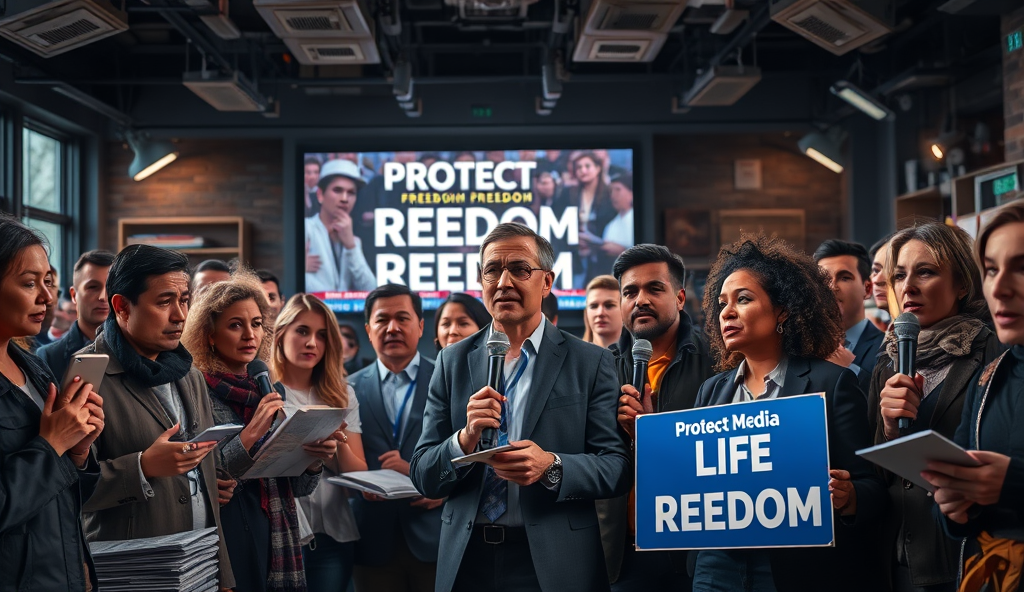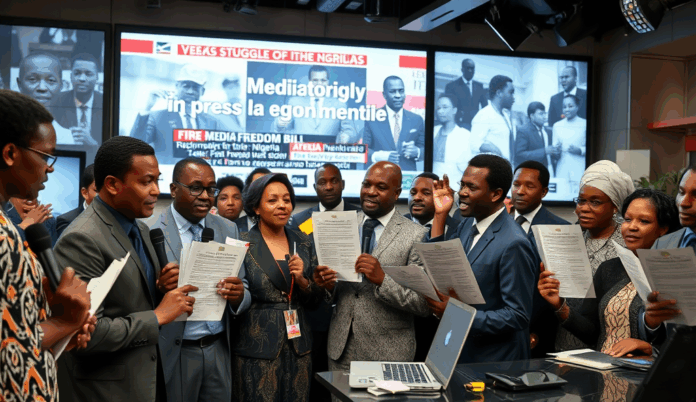Introduction to the Media Freedom Bill in Nigeria
The Media Freedom Bill represents a pivotal legislative effort to redefine press freedom in Nigeria, addressing long-standing concerns about government control of media and censorship policies. Proposed in 2021, the bill seeks to strengthen legal protections for Nigerian journalists while balancing national security interests, sparking heated debates in parliament about its potential impact on media independence.
Key provisions include safeguards against arbitrary arrests of journalists and reduced bureaucratic hurdles for media licensing, directly responding to Nigeria’s ranking of 123rd out of 180 countries in RSF’s 2023 Press Freedom Index. These reforms aim to align Nigeria’s media regulation laws with international standards while addressing local challenges like politically motivated lawsuits against investigative reporters.
As discussions continue, stakeholders await clarity on how the bill will navigate Nigeria’s complex media landscape, setting the stage for examining its historical context. The legislation’s progression reflects evolving attitudes toward freedom of expression laws in Nigeria since colonial times.
Key Statistics

Historical Background of Media Freedom in Nigeria
The Media Freedom Bill represents a pivotal legislative effort to redefine press freedom in Nigeria addressing long-standing concerns about government control of media and censorship policies.
Nigeria’s media freedom struggles trace back to colonial-era laws like the 1933 Sedition Act, which criminalized criticism of British authorities, creating precedents for post-independence press suppression. Military regimes between 1966-1999 institutionalized media control through decrees like Decree 4 of 1984, punishing journalists for “false news” with imprisonment, setting patterns that persist in current Nigeria media regulation laws.
The 1999 constitution introduced Section 22 guaranteeing press freedom, yet successive governments maintained restrictive frameworks including the National Broadcasting Commission Act (1992) and Cybercrime Act (2015). These laws enabled arbitrary license revocations and internet censorship, contributing to Nigeria’s consistent low rankings in global press freedom indices despite democratic transitions.
This historical context explains why the proposed Media Freedom Bill faces intense scrutiny, as it attempts to dismantle decades of institutionalized control while addressing modern challenges like digital surveillance. Understanding this legacy helps contextualize the bill’s key provisions currently debated in parliament.
Key Provisions of the Media Freedom Bill
Military regimes between 1966-1999 institutionalized media control through decrees like Decree 4 of 1984 punishing journalists for false news with imprisonment setting patterns that persist in current Nigeria media regulation laws.
The proposed Media Freedom Bill seeks to repeal repressive clauses in Nigeria media regulation laws, including Section 24 of the Cybercrime Act often used to prosecute journalists for critical reporting. It introduces safeguards against arbitrary license revocations by the National Broadcasting Commission, addressing a key grievance from Nigeria’s 2023 Press Freedom Index ranking of 123rd out of 180 countries.
Central to the bill is enhanced legal protection for journalists, criminalizing attacks on press personnel and requiring judicial oversight for media-related arrests. This directly counters historical patterns of government control of media in Nigeria, where over 25 journalists faced detention in 2022 alone under existing laws.
The legislation also mandates transparency in media ownership and establishes an independent ombudsman to handle complaints, aiming to reduce political interference that has plagued Nigerian media censorship policies. These provisions set the stage for parliamentary debates detailed in the next section on the bill’s current status.
Current Status of the Media Freedom Bill in Nigeria
Central to the bill is enhanced legal protection for journalists criminalizing attacks on press personnel and requiring judicial oversight for media-related arrests.
As of Q1 2024, the Media Freedom Bill remains in committee stage at Nigeria’s National Assembly, facing scrutiny from both legislative houses after passing first reading in late 2023. The House of Representatives’ Committee on Information has conducted public hearings with media stakeholders, including the Nigerian Union of Journalists which presented case studies of 17 detained reporters under current Nigeria media regulation laws.
The bill’s progress slowed during election petition proceedings but regained momentum after Nigeria dropped to 129th in RSF’s 2024 Press Freedom Index, reinforcing arguments for urgent reforms. Key provisions like judicial oversight for media arrests now face amendments from lawmakers concerned about balancing press freedom legislation in Nigeria with national security interests.
With parliamentary recess approaching, media advocates warn delayed passage could push final voting to late 2024, leaving journalists vulnerable under existing Nigerian media censorship policies. This legislative bottleneck sets the stage for examining the challenges facing the bill’s adoption, as discussed next.
Challenges Facing the Passage of the Media Freedom Bill
The prolonged legislative delays have left Nigerian journalists operating in legal limbo with 47% reporting self-censorship due to unclear boundaries under existing Nigeria media regulation laws.
The bill faces stiff opposition from security agencies advocating for retained powers under Nigeria media regulation laws, citing concerns over national security breaches through unrestricted reporting. Lawmakers remain divided, with some proposing amendments that could dilute key provisions like judicial oversight for media arrests, mirroring past struggles with press freedom legislation in Nigeria.
Budget constraints and competing legislative priorities further threaten timely passage, as only 12% of proposed bills in Nigeria’s 9th Assembly became law according to National Assembly records. Media advocates argue these delays perpetuate vulnerabilities under existing Nigerian media censorship policies, leaving journalists without legal protections during critical reporting.
Stakeholder disagreements over definitions of “fake news” and national interest exemptions continue to stall consensus, creating uncertainty about whether the bill can maintain its original intent. These hurdles set the stage for examining how prolonged legislative delays impact journalists’ daily operations, as explored in the next section.
Impact of the Media Freedom Bill on Nigerian Journalists
The bill’s passage hinges on reconciling security concerns with press freedoms as seen in recent National Assembly debates where lawmakers clashed over clauses like the 48-hour detention rule.
The prolonged legislative delays have left Nigerian journalists operating in legal limbo, with 47% reporting self-censorship due to unclear boundaries under existing Nigeria media regulation laws according to a 2023 Media Rights Agenda survey. Without judicial oversight provisions, security agencies continue making arbitrary arrests, including three high-profile cases of investigative reporters detained without charges in Q1 2024.
If passed intact, the bill would revolutionize journalists’ rights under Nigerian law by mandating 48-hour charge timelines and penalties for unlawful detentions, addressing key pain points in current press freedom legislation. However, diluted amendments could maintain status quo vulnerabilities, particularly for reporters covering sensitive topics like corruption or security operations.
These operational realities frame growing public debates about the bill’s necessity, setting the stage for examining diverse stakeholder reactions in the next section. Media unions and civil society groups have already begun mobilizing support through nationwide campaigns highlighting journalists’ daily struggles under current Nigerian media censorship policies.
Public and Stakeholder Reactions to the Media Freedom Bill
The Nigeria Union of Journalists (NUJ) has organized over 15 town hall meetings across six geopolitical zones since January 2024, gathering 2,300 signatures supporting the bill’s passage without amendments. Meanwhile, security agencies have quietly lobbied legislators for broader exemptions, particularly for reporting on military operations under Nigeria media regulation laws.
Civil society coalitions like the Media Rights Coalition staged simultaneous protests in Lagos, Abuja, and Kano in March 2024, citing the three detained journalists mentioned earlier as evidence for urgent press freedom legislation reforms. Conversely, some state governors argue the bill’s 48-hour detention rule could compromise national security investigations.
These polarized reactions highlight the delicate balance between journalists’ rights under Nigerian law and government control of media in Nigeria, setting the stage for examining international parallels in the next section. The ongoing debates reveal deep divisions even within the National Assembly’s media committees.
Comparative Analysis with Media Freedom Laws in Other Countries
Nigeria’s ongoing debate over press freedom legislation mirrors global tensions, with Ghana’s 2019 Right to Information Act offering a balanced approach that protects journalists while allowing limited security exemptions. South Africa’s Protection of State Information Bill, however, demonstrates how excessive government control of media can lead to prolonged legal battles and international criticism, similar to concerns raised by Nigerian civil society groups.
The U.S. First Amendment provides absolute press freedom protections, but Nigeria’s proposed 48-hour detention rule aligns more with India’s controversial sedition laws, which have been used to target journalists under national security pretexts.
These comparisons highlight the delicate balance Nigerian lawmakers must strike between journalists’ rights under Nigerian law and legitimate security concerns, as seen in recent National Assembly debates.
While Kenya’s 2010 constitution guarantees media independence, its implementation struggles with political interference—a cautionary tale for Nigeria’s Media Freedom Bill advocates. As Nigeria weighs these international precedents, the next section examines whether the current bill can overcome domestic opposition to achieve meaningful reform.
Future Prospects for the Media Freedom Bill in Nigeria
The bill’s passage hinges on reconciling security concerns with press freedoms, as seen in recent National Assembly debates where lawmakers clashed over clauses like the 48-hour detention rule. Civil society groups, citing India’s misuse of similar laws, argue for stricter safeguards against arbitrary arrests under Nigeria’s media regulation laws.
With Ghana’s balanced approach as a potential model, Nigerian advocates push for amendments to prevent political interference like Kenya’s, where constitutional guarantees haven’t fully translated to media independence. However, government resistance remains strong, particularly around national security exemptions in the Press Freedom legislation.
As stakeholders await the bill’s final draft, its success will depend on whether it can address journalists’ rights under Nigerian law while avoiding the pitfalls seen in South Africa’s restrictive policies. The next section concludes by assessing whether these compromises can deliver meaningful reform or dilute the bill’s original intent.
Conclusion on the Media Freedom Bill in Nigeria
The Media Freedom Bill represents a pivotal moment for Nigeria’s press, offering legal safeguards against government overreach while addressing longstanding concerns about journalists’ rights under Nigerian law. Despite parliamentary debates stalling progress since 2021, advocacy groups like the Nigerian Union of Journalists continue pushing for reforms that balance national security with media independence challenges in Nigeria.
Recent cases like the detention of Premium Times reporters underscore why this legislation matters, as current media censorship policies leave journalists vulnerable to arbitrary arrests. While the bill’s passage remains uncertain, its provisions could redefine freedom of expression laws in Nigeria by criminalizing newsroom raids and protecting whistleblowers.
As stakeholders await the next parliamentary session, the bill’s fate hinges on reconciling press freedom with national security concerns—a tension evident in Nigeria’s media regulation laws. Whether adopted or amended, its impact on Nigerian press freedom will shape journalism for years to come.
Frequently Asked Questions
How will the Media Freedom Bill protect Nigerian journalists from arbitrary arrests under current media regulation laws?
The bill mandates judicial oversight for media-related arrests and sets 48-hour charge timelines. Tip: Journalists should document all interactions with security agencies using encrypted apps like Signal.
What practical steps can journalists take to advocate for the Media Freedom Bill's passage without harmful amendments?
Join NUJ-organized town halls and use social media campaigns with #PassTheMediaBill. Tool: Media Rights Agenda's legislative tracker monitors bill progress.
How does the bill address Nigeria's low press freedom ranking compared to countries like Ghana?
It repeals repressive cybercrime clauses and establishes an independent media ombudsman. Tip: Study Ghana's Right to Information Act implementation for advocacy strategies.
Can the Media Freedom Bill prevent politically motivated license revocations by the National Broadcasting Commission?
Yes it introduces safeguards against arbitrary revocations and mandates ownership transparency. Tool: Use FOI requests to monitor NBC decision-making processes.
What should journalists do if detained while covering sensitive stories during the bill's legislative delays?
Immediately contact legal aid groups like SERAP and document detention details. Practical: Memorize key contacts for emergency legal support networks.


